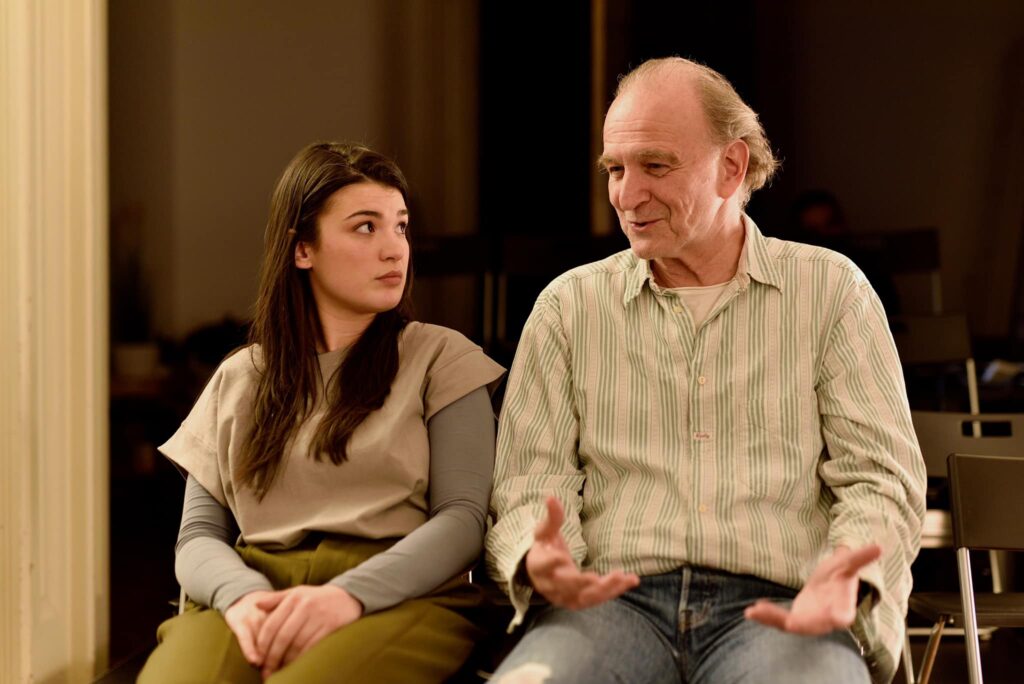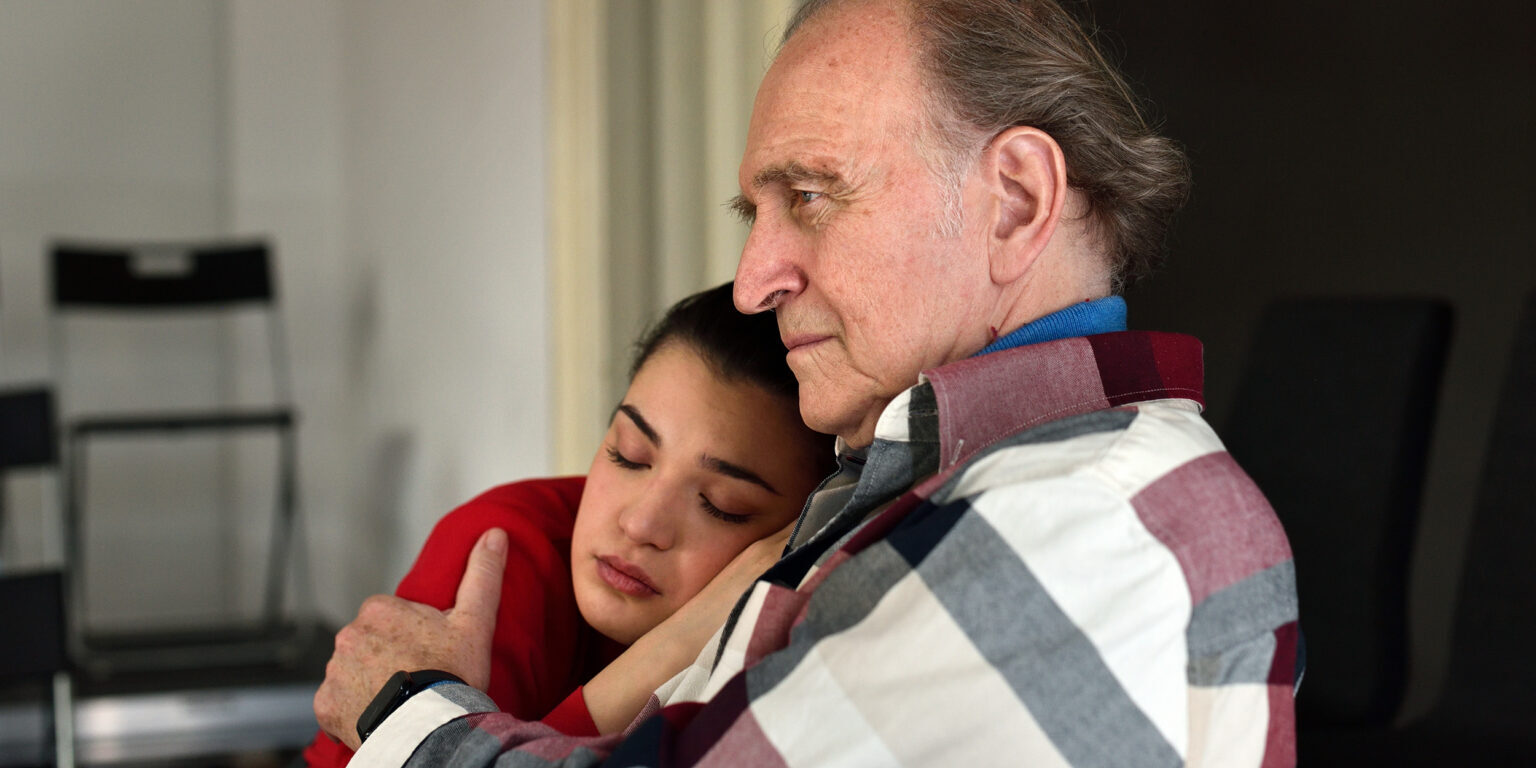Heartefact House, premiere 17th March 2024
After the Serbian #MeToo movement reached its peak in 2021, there was a public discussions about sexual violence, but it seems that we still don’t understand as a society the mechanisms and power dynamics that allow this violence to happen.
Paula Vogel’s Pulitzer-winning play, which premiered in 1997 in New York, is directed by Tara Manić for Heartefact. It depicts the complicated, abusive relationship which forms over time between a girl and her uncle. In the play, Li’l Bit (played by Marta Bogosavljević), now a grown woman, tells us a story about how her uncle Peck (played by Svetozar Cvetković) taught her how to drive a car – and how he essentially groomed her since she was 11 years old after she offered to talk to him every week if he stopped drinking.
In the non-linear play, we are shown different episodes of their time together over the years. Her uncle gives her driving lessons while touching her breasts. When she is 13 years old, he takes naked photographs of her. He visits her at college when she is 17 and counts the days until her 18th birthday when he expects them to finally have sex. On the night of her 18th birthday, she breaks up with him. After that he goes back to his addiction to alcohol, loses his job, his wife leaves him, and he dies after falling in the basement. Li’l Bit is, however, empowered despite this traumatic experiences. She is able to forgive him and move on with her life, driving into the future.
The play shows very well how a lack of boundaries in the family can prepare the ground for abuse. Over a family dinner, Li’l Bit’s cousins talk about her breasts, objectifying her and making fun of her. In this scene, Marta Bogosavljević plays all the family members, switching from one voice to another, a performance that is at once humorous, while also conveying the uncomfortable atmosphere that makes Li’l Bit so angry that she leaves the table.
Everybody in this family has a nickname related to their genitalia, so Li’l Bit is called because of her small vagina, her grandfather is Big Papa, her sibling is Blue Balls, and so on. It is only when Li’l Bit goes to college and moves to a student dorm, that she starts to realize how warped the relationships in her family actually were.
We are also presented with that canard that “girls get mature earlier”, and there is a clear misogynistic attitude in the way Uncle Peck lectures Li’l Bit about driving, addressing her in the same tone sexist professors use towards their students. Uncle Peck talks about his car as if it is a women, calling it The Machine, and speaking about how he feels powerful when he drives her, comparing driving to sex and describing the feelings of control and power he feels in a car. Uncle Peck teaches his niece to drive “like a man”, without empathy and mercilessly. (Which made me think of the fact that Danijela Štanjfeld accused Branislav Lečić of raping her in her car; he was also her role model and mentor).

How I Learned to Drive, Heartefact House
Bogosavljević and Cvetković both give amazing performances, achieving a perfect balance between making the audience uncomfortable, yet also making it safe to experience these traumatic events, never minimizing it, never relativizing it, making us feel empathy towards Uncle Peck, without ever letting us forget that he is behaving inappropriately.
Cvetković portrays an self-destructive, mansplaining, paedophile with pathos. while Bogosavljević convincingly plays a child through different phases of adolescence and pre-adolescence. She is a young woman playing a girl in an abusive situation, yet she never falls into the trap of portraying her as a Lolita, a hypersexualized girl who is willingly provoking the older man. At the same time Bogosavljević shows her character is a sexual being, she has a desire of her own, and she does feel some sort of attraction towards her uncle. Her feelings of empathy, love, admiration, and desire are mixed up with feelings of fear, shame, and anger. She is a naïve girl with a good heart, who is never really seen by anyone around her, except for her uncle, who then takes advantage of it. Sometimes she makes jokes about her uncle molesting her, but her laughter comes from a place of discomfort and fear.
Manić’s production feels especially warm because it’s performed in the apartment that Heartefact uses as a performance space. The atmosphere is one of incredible intimacy. The audience surrounds the performance space on all sides, witnessing things from a very close perspective, and the actors sitting among them and takinf the opportunity to look them in the eyes whenever they can. In the end, when Li’l Bit finally drives a car, she looks the audience in the eyes and says she’s checking the rear-view mirrors. This use of eye contact is such a discrete yet powerful way to break the fourth wall. Sometimes this can be used to make the audience uncomfortable, with the performers disrespecting people’s boundaries. However, since this show is all about the violation of boundaries, Manić and the actors are careful to respect them, maintaining them, while still communicating the message.
This staging of the show is very minimalistic and simple – it’s just two actors in their regular clothes, a couple of chairs, plus a little bit of music to set the tone – and a careful director’s eye, one that clearly cares about presenting this sensitive topic.
Credits:
Written by Paula Vogel//Director: Tara Manić //Translation: Ivana Đurić Paunović//Adaptation: Vuk Bošković//Scenography/ Costume: Zorana Petrov
Music: Vladimir Pejković//Light design: Nemanja Calić i Zorana Petrov
Cast: Svetozar Cvetković , Marta Bogosavljević
For tickets and more information, visit: Heartefact.org
Further reading: Heartefact’s Andrej Nosov: “Theatre fits this political space”
Mina Milošević is a playwright, dramaturg, screenwriter, and theoretician based in Belgrade. She holds a BA in Dramaturgy and an MA in Theory of Drama Arts at the Faculty of Dramatic Arts in Belgrade. She worked as a dramaturg on plays in Atelje 212, Belgrade Drama Theatre, Yugoslav Drama Theatre, National Theatre in Belgrade, and Oda Theatre in Prishtina. Her play "Dr Ausländer (Made for Germany)" was presented at BITEF festival 2022. Her master's thesis on female friendship in Serbian contemporary theatre won the "Professor Boško Milin" Award.








